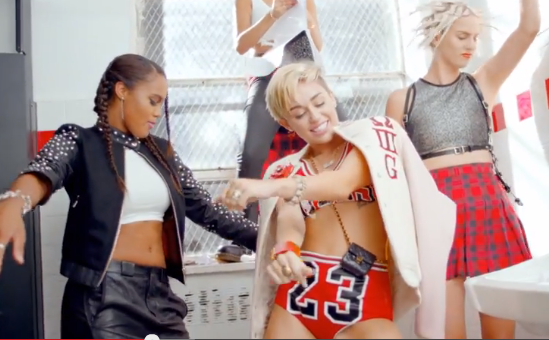Miley Cyrus Exploits Black Culture In New Song '23'

Young celebrities acting like hot messes is nothing new. It seems like rebelling against Hollywood is a popular method for those trying to keep themselves relevant.
Enter none other than Miley Cyrus. The starlet has been in the news more times than one can count. Some say Cyrus has lost her mind, and although I do worry for her mental health, there is another irksome issue surrounding the 20 year-old singer.
Race. And in this particular instance surrounding Miley and her latest stunts, I’m concerned with the singer’s appropriation of black culture.
We’re all well aware of Miley’s shocking performance at the VMAs. We witnessed the twerking and the sexual exploitation of the black female body as Miley proceeded to slap the butts of her background dancers. Even after such an appalling performance, I was willing to let Miley slide. Although I was disturbed by the performance I figured it was 1) merely for shock factor and 2) a desperate plea for attention. In fact, maybe I was so willing to let it go because as a black woman in America, I have become numb to the media exploiting my body, because it is that much of a “spectacle.”
But after witnessing the succession of events that followed her infamous VMA performance (i.e. the “23” music video, the countless interviews after the VMAs and unnecessary hype revolving around the star), I can honestly say that I am quite through with people capitalizing off of black culture or the perception of “blackness.”
White appropriation of black culture is nothing new. It’s undeniably prevalent in American popular culture—particularly in music. For example, if you look up the real founders of the rock n’ roll genre and names such as Muddy Waters, Little Richard and Chuck Barry don’t pop up—use a better search engine because they are some of the key originators of the style.
Recently, Miley released her newest music video “23”—a hip-hop song featuring Juicy J and Wiz Khalifa, based off the iconic basketball figure Michael Jordan and his popular Jordan sneakers.
The issue isn’t that Miley wants to make a rap song or twerk an otherwise jiggle-less butt. The problem is that she’s promoting a culture she knows nothing about and is using it to stay relevant.
The young singer has been caught many times emphasizing the “swag” of black people and according to Miley, being black isn’t a race, it’s an "attitude.” By paralleling blackness with swag, Miley is simultaneously stereotyping black people, implying that they are all homogenous. Basically, they are Jordan-wearing, swagged out, blinged-out rapping folk. This confused notion is clearly evident in her “23” video.
If you’ve heard the song, you know that Miley boasts that she’s “tatted up, mini skirt, with [her] J’s on,” “naughty by nature like hip-hop hooray” and that she’s “MC Hammer fly.” The music video is a mere reflection of her boasts. Miley basks in the stereotypical perceptions of blackness—hip-hop, basketball, J’s, bling and swag.
Miley even acknowledged in her Billboard interview that she was aiming for a “black sound” and a “black feel” in her music. But don’t get confused, Miley’s not “hood.” In the same interview with Billboard, she makes sure to tell you that she’s not “urban” or “hood” like Nicki Minaj. She just likes hood music.
Too often in society, the words “urban” and “hood” or even “ratchet” are used interchangeably for describing “blackness.” When something happens that is associated with “blackness,” many times people sugarcoat it and call it “urban” or “hood.” I’ve heard my friends do it, and I’m sure you’ve heard yours do the same. But the meaning behind the euphemisms is unchanging. The fact that Miley feels the need to differentiate herself from the “urbanness” or “hoodness” of Nicki Minaj shows that she is trying to capitalize off a certain appeal, as she does in “23,” but not face the consequences that come with actually being black.
Miley wants to get down and have swag, but she doesn’t want to associate with the pain and oppression that comes with being a black person in America. But who would want to be burdened with a history of separation, enslavement, lynchings, rape, police brutality and systematic oppression?
Fortunately for her, Miley is able to have the best of both worlds. White appropriation gains its power by exploiting another culture and using it to its advantage. Miley is able to rap and twerk her way to the top—becoming the biggest trending topic on Twitter for weeks, even though black people invented both rap and the twerk and have been doing so since their origins.
It’s funny how history repeats itself.
Miley’s twerking and "23" video only symbolize the larger issue of white appropriation of black culture in America. It seems that more people want to be black, without having to be black. People will get breast implants, butt implants, make their lips fuller, rap, sing with soul, play jazz and rock n' roll, say certain words, and do just about anything to be in the likeness of blackness.
But make sure you don’t call them black, because being black in America is just not cool. Or is it?
Reach Staff Reporter Jillian Baker here.



